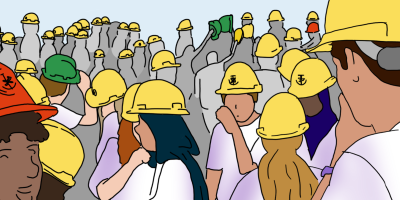Conscious consumption is a contentious idea – on one hand, people should be aware of their actions and act in the interest of global sustainability and equality. On the other hand, a conscious consumer can only do so much in promoting sustainability and equality – this should be demanded by producers and enshrined in social values and laws and regulations at the national and international level. In addition, there is the meta-issue of the trade-off between the time that would be involved in researching a product or service extensively yourself and taking what is presented by corporations or advocacy groups at face value and saving some time.
From the lens of Western conscious consumerism (which I’m using just as an exercise and to help you relate to my gut reactions, not because it’s necessarily a good idea), Ghana has a spectrum of acceptable and unacceptable practices.
One of the most frustrating thing I have noticed in Ghana is the prevalence of plastic bags and lack of solid waste management. Everything you buy is wrapped in a black plastic bag before being handed to you – I’ve had take-away food that was double-bagged, put in a polystyrene container, then bagged again, and bought three bottles of soy milk that were placed in individual bags. Drinking water is most commonly consumed in 500 mL plastic sachets that cost a nickel and end up everywhere. This prevalence is aggravated by the lack of trash cans. Garbage either whizzes around in the wind until it settles in a bush or gutter or is amalgamated in a pile where it is later burned. The particulate content of the emissions are so high that the black smoke plume created drops back to earth after rising up for a while, creating a black garbage smoke rainbow that is less than desirable. Seeing the amount of trash brought to life the idea of the Antropocene Era–the concept that geologists of the future will look back to the current period and find a stratum of plastic, radioactivity, and artificial chemicals -in a way that is invisible in my daily life in Canada. There is also no systematic process for recycling metals such as steel and aluminum, although I have seen people sifting through trash for recyclables, though not to the extent carried out in China, so I suppose there is a market somewhere; it just hasn’t been municipally administered yet.
There are, however, a few processes in Ghana that really appeal to Western conscious consumers. The first is the widespread use of bottle return and reuse. This is led by retailers, who can’t get their deposit (which must be large enough to care about) back from distributors unless they return full cases, but it has also seen widespread participation by the general population; people will helpfully remind you to bring your bottles back to the shop they came from and bus drivers won’t let you on the bus until you finish your drink and return the bottle. However, I fear this is slowly being eroded by businesses using plastic bottles or nonreturnable glass ones like in North America (save liquor bottles, Quebec, and some cities in the Maritimes that I know of). Another plus for Western conscious consumers is the lack of big box stores (except for Melcom), prevalence of local artisans (carpenters, tailors, bakers etc. instead of pre-fabricated store bought products), locally-sourced foods and materials (for example, they make bricks on-site to build houses). In the Shock Doctrine, author Naomi Klein quotes an executive from New Bridge Strategies, a globalization firm headed by the head of FEMA under bush, saying “one well-stocked 7-Eleven could knock out 30 Iraqi stores; a Wal-Mart could take over the country.” If the efficiency introduced by a big chain could wipe out local businesses and snatch up the market, I wonder why it hasn’t been done in Ghana like it has been done all over the West and increasingly in emerging markets. Some reasons I’ve speculated on are that the market is too small, local preference trumps cheaper products from foreign companies, a lack of investment due to misconceptions surrounding much of Africa(perpetuated by NGOs, movies, and media coverage), and high local transportation costs making locals more competitive.
Until now I have purposely described my gut reactions to what I see in Ghana from the point of view of a well trained middle class consumer. I’d now like to explain why this point of view is harmful and search for some synthesis on cross-cultural learning that would help us set up a reality-friendly economy.
Firstly, plastic bags, reusable water bottles and recycling have all become irrational crusades in which I believe advocates have set their ambitions too low. I now have roughly 400 reusable grocery bags and about a dozen water bottles – but no one is talking about how every piece of food they pick up from the grocery store is packaged in the equivalent amount of material as many plastic bags, or beyond that why grocery stores waste such colossal amounts of food, paste a friendly farm veneer on every industrially processed product, and disconnect people with the realities of where food comes from. For a wider examination of how messed up the food system has come, I found Food Inc. to be a well done documentary. As for recycling, we don’t do it very well and it is only one of the three Rs that perpetuates consumerism. I have classmates (in environmental engineering no less) that don’t recycle or compost, even in Waterloo where good services are readily available. In addition to not being able to recycle many things, we recycle things that can be reused all the time – like glass jars and bottles that are instead smashed and remade instead of being sterilized and refilled. Obviously economics is governing this, but our alternative is to bury our trash where we can’t see it. If we do the best job possible, we’ll drain the leachate and collect the offgas (and maybe even use it for electricity or cogeneration) and reclaim the surface – but this is still not feasible. There are some cool things being talked about around closed-loop production and consumption and cradle-to-cradle life cycles – I wonder how long it will be until this becomes the norm? Will it happen faster in Canada or in Ghana?
The last thing I’ll rant about is the new trend of buying local. I think in Canada, people support buying local before really understanding why they are. Buying local goes against benefits from trade and decreases the material wealth of a region. If Thunder Bay is undesirable for producing agricultural goods because of the growing season it makes sense for us to specialize in ecotourism, and use that money to import food. Conversely, we are depriving other regions of economic development as well by not providing them a market to export to. In reality, we rely extremely heavily on imports (both regionally and nationally) and I feel as if the “buy local” movement is taken at face value without enough exploration of its many weaknesses. If we really cared about buying local we would pull out of NAFTA and WTO, and not just be happy because the cheese in our Japanese fridge is from down the road. Buying local, although it can stunt economic growth by eliminating the benefits from trade, is extremely important for three reasons. The first is resiliency – in the event of some sort of crisis, being self-sufficient is the difference between living and dying. Factoring this into the optimal risk management for an economy is almost always ignored in a system that craves market bubbles to cash in on. Secondly, the market power is too easily influenced by big corporations. Some firms are powerful enough to distort the market and starve out local businesses as a rent-seeking activity, and not necessarily because it’s the most economical way. Wal-Mart was notorious for doing this all over North America. Thirdly, corporate profits are funneled to the centre of the corporation and are not directly redistributed like in a cooperative, and unless your city has a big headquarters, having a non-local business just means you’re constantly shipping wealth to a big city where many headquarters are located just for the efficiency of having a business hub. My personal belief is that concentrating wealth with the rich in big cities is a really terrible way of developing a country, and that we should enforce some better way – I’d love to hear your thoughts, though.







Leave a Reply